#with depth and nuance that isn’t a slap in the face to viewers and that succeeds anyway because of course it will
Explore tagged Tumblr posts
Text
Now let’s summarize what they actually did. This is important. Read it. Really read it.
1. They broke the narrative contract with the audience
Viewers spent the entire show watching Nick being portrayed as an emotionally mature, loyal, kind character. His development was consistent and nuanced. And suddenly, in the final episode, without any build-up, his behavior collapses and this is not a plot twist, it’s a betrayal of narrative logic. Such an abrupt shift is a slap in the face to viewers who emotionally invested in this arc.
2. They destroyed the payoff after a long buildup
For six seasons, viewers followed June and Nick through pain, choices, moral struggles. They were constantly given hope: “Soon there will be something big.” They built huge emotional anticipation. And the payoff? A mockery. They just dumped the entire arc, not through catharsis or tragedy, but through a silly death without dignity or context. That’s a violation of dramatic justice.
3. They used fans as a tool
Fans of Nick and June were fed scenes, cinematography, parallels, close-ups only to be emotionally punished at the end for caring. That’s not storytelling. That’s manipulation. It’s like promising a feast and shoving moldy bread in someone’s face at the end (a love letter lmao I’m like ???)
4. They replaced tragedy with cynicism
They could have killed Nick tragically, with depth, as a symbol of how even good people die if they keep looking away too long. That would have worked.
But no. First, they make him look like a traitor. Then they kill him. And they don’t even let us mourn him. This isn’t tragedy, it’s a cynical stunt for cheap impact.
I can’t believe that only him and Lawrence died 😱 and that he was constrasted with Lawrence
5. They killed the rewatch value
People won’t want to rewatch the show. Because everything that once felt beautiful, honest, meaningful, now feels like a lie. Because the ending undoes the journey. And good storytelling should do the opposite: the ending should complete the journey, make it more powerful. Here? It erases it.
In conclusion:
They sold fans a love story and in the end, spit in their faces.
174 notes
·
View notes
Note
Charlie Chan. Who is fascinating, because he was created explictly to be an anti-Yellow Peril character. Unlike most Chinese characters of the time, he's both intelligent, physically capable, and unambiguously heroic. In the novels, he's simultaneously proud of being Chinese AND proud of being an American citizen. He gives orders and instructions to white people, and the narrative treats this as perfectly normal and acceptable. There's a bit in the first book, when an attempt to trap the..(1/2)
(cont'd)There's a bit in the first book where an attempt to trap the protagonist fails, because a message supposedly from Charlie clearly isn't because Charlie's English isn't broken, it's like poetry. Etc. The movies made him more stereotypical, & played by white actors in yellowface, but still, he's a heroic Chinese man, who is as capable and patriotic as any white man. Nowadays, he's thought of as racist caricature. Which he is, but still, it makes one think.
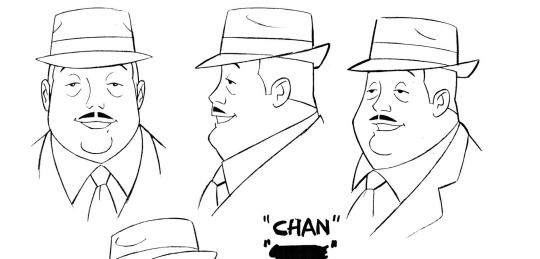
I'm not nearly as acquainted with Charlie Chan as you are (and I definitely suspected he was less racist in the original books because that's nearly always the norm when it comes to pulp characters) but yeah, that "Which he is" is forever going to be the most unfortunate and saddest part of it all when it comes to Charlie Chan. For all the virtues that can be bestowed on Charlie Chan, for everything great that the character had going for him and inspired, the fact that the least offensive image of the character I could find to put here for illustration's sake is from the Hanna-Barbera cartoon kinda exemplifies the big elephant in the room when it comes to Charlie.
Charlie Chan is a great example of two things: One is the way progress is never a fixed quantity and often what was progressive and forward-thinking in it's time can become something outdated and backwards and downright offensive given enough time, and the 2nd is my constant stressing that this is all the more incentive to reclaim the pulps and either highlight or fix aspects of them, instead of dismissing every aspect of them based on the preconception that everything about it's history is unforgivably bigoted and must be handled with the nuance of a sledgehammer.
I stress time and time again the need to highlight and understand the prejudices that went into pulps, because either ignoring them or wielding them as a weapon to attack them does no favors to anyone. The pulps weren't exceptionally bigoted - look at literally any medium in it's time period and you'll find bigotry and prejudice and hatred - and they were exceptional in the number of POC heroes and heroines. Pulps were a medium of experimentation and cheap entertainment that gave way to much, much more varied kinds of protagonists than were permitted in films, serials, novels, comics and radio serials of the day. Imagine if no one was allowed to bring up and discuss superheroes without mentioning the Superman Slap-a-Jap posters or the Captain Marvel story so horrifingly racist it was recounted by an American ambassador after it deeply offended a friend's son and a major influence on the 1950s anti-comic trials. "Pulp fiction had deeply, unforgivingly racist depictions that deserve intense scrutiny and cannot be ignored" and "Pulp fiction was significantly ahead of every other medium at the time in regards to authors and editors striving to publish stories about heroic POCs, this cannot be dismissed and is something that needs to be perpetuated" are not exclusive facts. "A product of it's time" is not an excuse and never was, but it's a fact nevertheless.
Every time someone speaks favorably of Charlie Chan in any capacity, they have to start with a long preface of everything positive that the character had going for him. Yes, he's a deliberate subversion of the Yellow Peril, he's a heroic protagonist, he's plump and good-natured and humorous but far from a joke, he's friendly and pleasant and well-educated and wise, he's a good dad and family man and a terrifically sharp detective who's so good at his job he gets called to solve crimes all over the world, and none of these traits are apparent to people who have to google the character and repeteadly see a white man in awful make-up into every single image of the character, who watch the movies and cringe at the broken English. It's hardly relevant in the face of all the Asian-American critics who acknowledge the character's virtues but rightfully point out that this fortune-cookie spouting caricature, acting subservient to whites and whose virtues are based around his proximity to a white American ideal, doesn't represent them and they shouldn't pretend it does.
Which isn't to say that to like Charlie Chan is "wrong", a lot of East Asians love Charlie and the character's obviously got fans in Asian Americans. It's a complicated subject and I obviously cannot begin to vouch in a subject so heavily based around perceptions I cannot experience. And I deeply detest the idea of speaking for others on their particular experiences on this kind of matter, which is something Americans do a lot everytime they talk about representation in media.
So instead, I'm going to tackle this on a roundabout manner by going on an unrelated tangent to bring up an example of representation that isn't quite representative of what it's supposed to be, has a lot of issues that have been dissected by critics among the people it was supposed to represent, and none of that stopped the character from being popular and beloved and from being claimed anyway. And it's a Brazilian fighting game character, which means it's completely within my ballpark.
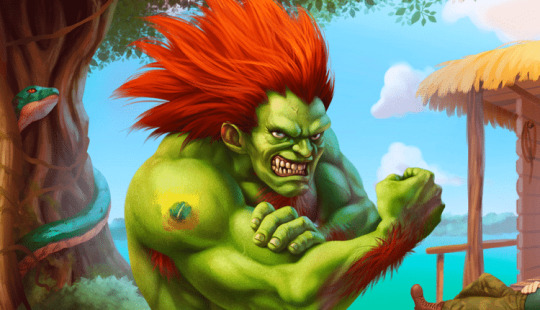
Yeah, obviously Blanka doesn't look like anyone who lives in Brazil (whatever resemblance he bears to redheaded jungle protectors of Brazilian folklore is purely accidental). Obviously neither Jimmy nor Blanka are Brazilian names or even exist in the Portuguese lexicon. Obviously there are issues in Street Fighter's approach to representation across the board, sure, and I'd actually say Laura is much worse than Blanka in that regard (again, my opinion, obviously not universal), but the fact remains that Blanka is and has always been pretty controversial. Obviously there's Brazilians who took offense to Blanka and they weren't wrong to do so, and I obviously do not speak for everyone here, that goes without saying.
Obviously the idea that Brazil's major representative in a global cast of characters, the first big name Brazilian character in videogames, is going to be a freakish jungle monster who roars and bites faces has problems, as is the fact that all the others get to be regular people representing fighting styles from their countries while Blanka doesn't. None of the Brazilian SF characters represent Capoeira, which is kinda shitty to be honest. And there's a whole stereotype of Brazil as a backwards land of beasts and savages that Blanka's creation played into. There's no shortage of ground to criticize Blanka's representation and Ono actually apologized in an interview once, but then he learned one teensy little thing:
Street Fighter is very popular on Brazil. Would you like to leave a message to the fans from there?
"Ono: Yes, I'm aware. At the time of Street Fighter II a lot of the arcade machines produced went there, so I knew we had lots of fans there. A message to Brazilians, well, I'd like to apologize. I know Blanka's a weird character and I don't want any Brazilian to feel uncomfortable with that.
When Blanka was conceived, we knew there were forests in Brazil, and so we thought he could look like that. I was actually kinda nervous knowing I'd meet Brazilian journalists. Still, this is the first Street Fighter in ten years, so we'd like all fans to play, including Brazilians, which are many.
Thanks. Well, but you should know that Brazilians love Blanka
"Ono: Ah, good! I was scared of getting beat up if I ever went to São Paulo! (laughs)"
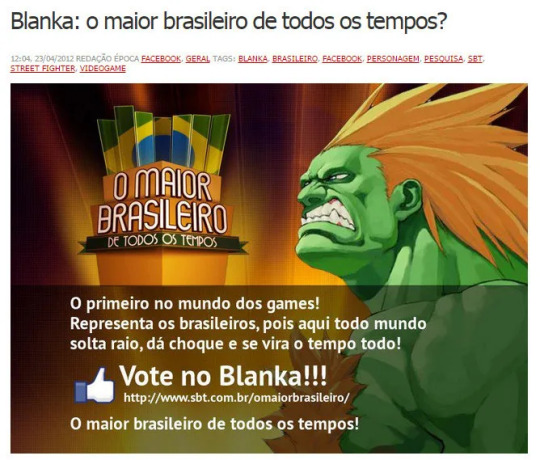
(That's from a 2012 tv special called The Greatest Brazilian of All Time where over a million viewers voted to elect whoever they wanted, and Blanka was going to win. He was polling ahead of Aryton Senna and PELÉ, fucking Pelé, yes this happened. He wasn't even disqualified for being a cartoon character, it was an open poll, he was disqualified due to canon stating he had been born in Thailand, which I think may have been retconned since then. Again, A MILLION BRAZILLIANS voted for this contest, and Blanka was going to win.)
Blanka is great and sweet and lovable, he made the best out of the incredible shitty hands fate dealt him and became a cool and strong green man who shoots lightning and flies, a self-taught warrior who rides whales and planes to fighting tournaments, and he loves his mom and friends and kicks ass and after he's done he dances in joy and gives the kids of his village piggyback rides, and Brazil loves him. He doesn't represent any existing person or fighting style, he's rooted in a negative stereotype and incorrect assumptions, he's not even really Brazilian, and he's our boy and nobody can take him away from us.
No criticism of Blanka, no matter how in-depth or even right it is, is ever going to affect that, because regardless of what was wrong or misguided and offensive about him, we claimed him and loved him so throughly that Capcom kept playing up Brazilian representation in every subsequent game post Alpha, and because of Blanka's impact and reception in such a big game, Brazilian characters have become a staple of fighting games, and that's how we got much more diverse representatives in those games. Fighting games have more Brazilian representation than LITERALLY ANYTHING ELSE on media not produced here. It started as BAD representation, with way less thought put into it than Charlie Chan, and it still mattered to a lot of Brazilians who reclaimed it and made it better than it was ever intended to be, and as a response to it, it gradually became better.
Progress is not a fixed quantity, it's an uphill battle, and it's not unwinnable. Everything's gotta start somewhere.
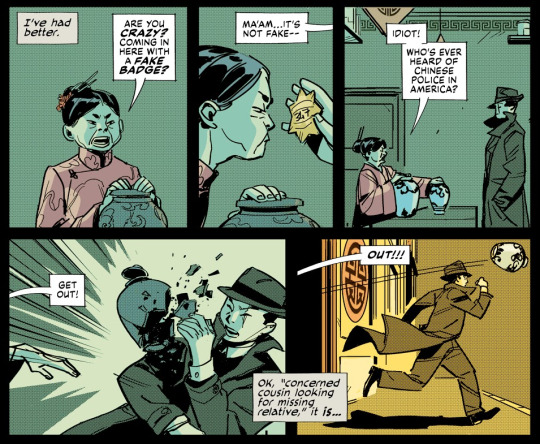

The Good Asian is a ongoing comic that I think does the best job I've seen yet of handling an Asian American detective protagonist, which is not really a high bar in the first place, and more to the point, The Good Asian illustrates the 2nd part: the reclaiming. The Good Asian deals a lot with the realities that a 1930s Asian-American detective would run into, the strained circumstances and relationships between said character and the world around him, because it's born from an author who took a look at Charlie Chan and Mr Moto and the like and recognized the potential in those stories that could not be fulfilled in it's time period by the people writing said stories.
The Good Asian pays little reverence to Charlie Chan, but it acknowledges that it cannot exist without Charlie Chan, and it reclaims the Charlie Chan premise at the hands of someone more adequately equipped to tell a gripping story that goes places none of Charlie's contemporaries would ever go. Regardless of how good or bad of representation Charlie Chan was, Charlie Chan mattered and was beloved and inspired a better example for others to improve on or rebel against.
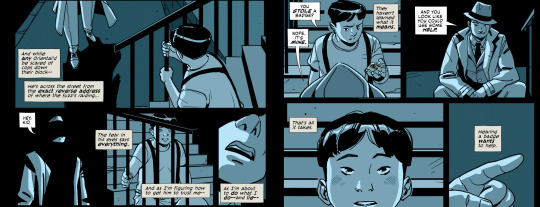
I desperately wish that I could google Charlie Chan without having to look at a guy in yellowface, and the ONLY way that's going to happen is if the character ever gets meaningfully brought back and reclaimed for good by people who can meaningfully tackle the character and present him as he should have always been presented.
And then, I imagine it would be a lot easier to show people on how swell Charlie really is. A true, positive role model and hero, who no longer has to look like a gross cartoon to be able to exist at all. Who can finally be what he was always meant to be, and always was deep down.
#replies tag#pulp heroes#pulp fiction#charlie chan#detective fiction#the good asian#street fighter#blanka
54 notes
·
View notes